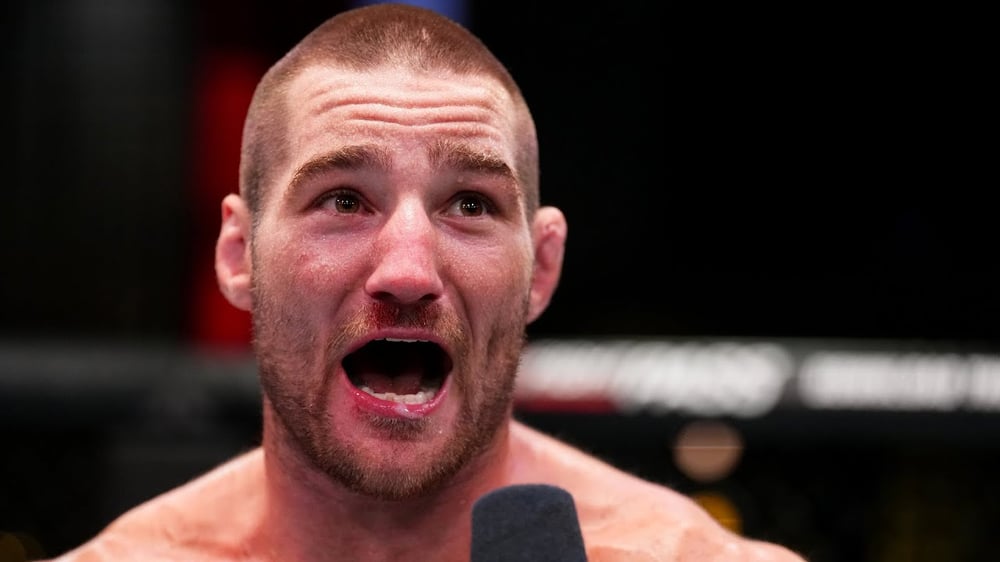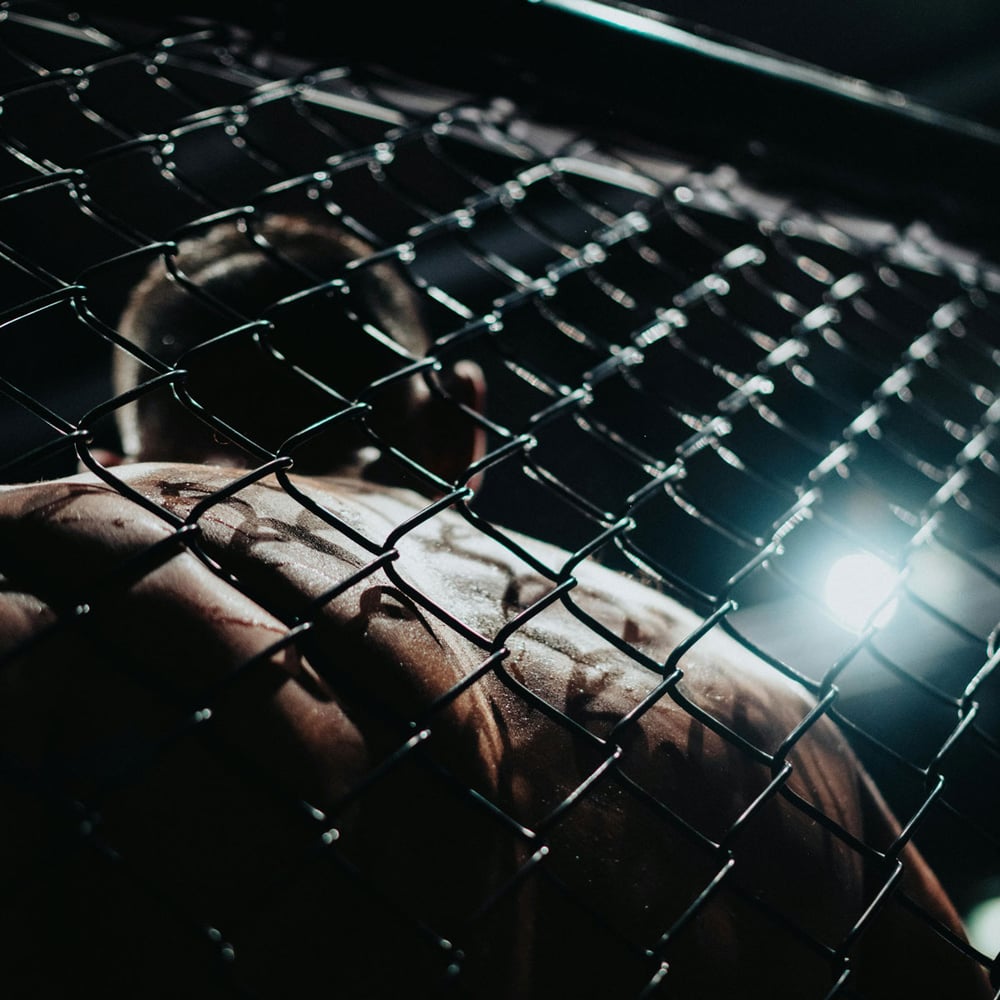
Issue 209
September 2024
Ray Klerck explores how MMA is not just about overcoming challenges—it’s about discovering a new way to face life with resilience and strength you never knew you had.
Healing from your trauma doesn’t have to happen in silence or stillness. Sometimes, it’s best achieved by throwing an angry elbow in the direction of your pain. Life has a habit of being cruel, and as many as 70% of US adults have suffered through some form of traumatic event, according to research published in Psychological Medicine. Sound like a big stat? That’s because trauma is relative. It isn’t measured by the weight of the event but by the depth of its impact. What breaks one person might barely bruise another, yet both wounds are equally real. Trauma fueled some of MMA’s greatest fighters. Sean Strickland. The Diaz brothers. Rose Namajunas.

The list is exhausting. Just read our Fight Before the Fight section, and you’ll find plenty of examples. From childhood experiences to the scars life leaves behind, everyone has their own battles to fight. To the uninitiated, MMA might seem like little more than physical activity, but it is also a powerful outlet that can heal the mind. So, while many people might expect to find emotional relief from their damage at the end of a dumbbell or the bottom of a protein shake, real growth can often happen inside the unassuming surroundings of a local MMA gym. Instead of collating subjective interviews from the people advocating for MMA as the source of their trauma recovery, we break down the objective research behind why MMA is such a powerful healing force that anyone can use.

THE ULTIMATE SELF-HEALING ARENA
Training in MMA is one of the ultimate tests of your mental fortitude, and for those who’ve faced trauma, it can be a massively uplifting experience. It’s far more than just a way to beat someone up or get fit. MMA and all martial arts develop discipline, focus, and awareness—traits essential to navigating the aftershocks of your trauma. Fighters condition their minds each time they show up to learn new skills. Every punch thrown and every move you defend against is less about physical reaction and more about staying in the moment, something trauma survivors often struggle with. A study published in Frontiers in Psychology highlighted how martial arts promote mental clarity and focus. These traits can be crucial in managing anxiety and post-traumatic stress disorder (PTSD). The researchers discovered that training in martial arts improves your ability to maintain vigilance and prepare for unpredictable stimuli, which means they have a heightened level of cognitive control compared to people who don’t train in MMA. By requiring intense concentration, MMA training forces you to stay grounded and present in your body, offering a reprieve from negative thoughts and dissociation, a common symptom of trauma. One of the most common responses to trauma is dissociation, says a paper in the Delaware Journal of Public Health. Dissociation is where you feel disconnected from the world, as if your mind is a wandering balloon floating far from your body. MMA pulls you right back to Earth with the force of a well-timed kick. The sport demands presence. You can’t space out when you’re training to defend against someone coming at you with a fist aimed at your face.
GROUNDING THROUGH MEDITATIVE BREATHS AND MAT WORK
Part of what makes MMA so effective at healing your trauma is its focus on grounding techniques. Grounding here refers to strategies that bring you back to the present, making you more aware of your surroundings and your body. And MMA? It’s nothing but grounding. MMA inherently builds mind-body awareness. Whether you’re in a jiu jitsu class learning how to defend an armbar or a Muay Thai session perfecting a clinch, you must be dialed in. Staying present is one of the key tactics for trauma recovery. A study published in the British Medical Journal found grounding exercises, like those practiced in martial arts, helped trauma survivors reduce the frequency of dissociative episodes. These aren’t super complicated. Instead, these involve techniques such as focusing on your breathing, bodily awareness, and repetitive motions, which encourage mindfulness and can anchor you in the present moment. This not only helps to control your fight-or-flight responses triggered by trauma but also builds emotional regulation, making it easier for trauma survivors to face challenges when they leave an MMA gym. The benefits go well beyond getting in shape. Instead, you can help get a sense of control over your life that may give you a renewed sense of confidence and power.
CONFIDENCE IN THE CAGE, CONFIDENCE IN LIFE
Let’s be brutally honest: MMA isn’t for the faint of heart. Even sparring for the first time can be as terrifying as a fight in real life. But here’s where the magic happens. When you face your fears in a controlled environment, like an MMA gym, you slowly start to develop your deep-seated levels of confidence. Every class completed, every technique mastered, and every punch landed gives you a little more belief in yourself.
For trauma survivors, rebuilding self-confidence is a way of rewiring your brain. So, while trauma has a nasty way of chipping away at the belief that you can handle life’s challenges, MMA teaches you otherwise. It shows you that not only can you handle a jab, but you can return it with interest.

A study from the American Journal of Men’s Health researchers found that participants in combat sports, including MMA, showed massive improvements in self-esteem and self-efficacy. Most notably, the sport broke stigmas about seeking help when they needed it, which many men are reluctant to do. MMA was seen as a masculine gateway to accessing therapy for those who might otherwise avoid mental health services. The program's coaches and mentors became crucial positive male role models who could help them develop emotional resilience. Finally, when the study participants integrated both therapy and MMA, they reported improvements in their mental clarity, reduced anxiety, and enhanced overall well-being through this dual approach. So, if you don’t like the idea of sitting on a couch and talking it out, there are other options for healing your trauma because MMA doesn’t just teach you to be physically strong; you learn to be mentally strong, too.
DISCIPLINE: THE HIDDEN SUPERPOWER
MMA and all martial arts thrive on discipline. Their foundations are built on the kind of self-regulation that gets you up at 5 am for sparring and sees you meal-prepping like a master chef when you get home. That discipline spills over into everyday life, creating a structure that’s invaluable for trauma recovery. Routine is healing. The predictability of knowing you’ll train at a specific time, with a certain coach, for a set goal helps rewire a brain frazzled by trauma. Studies show that the repetition and focus required in martial arts lead to improved self-regulation, a skill that trauma survivors often struggle with. A paper at Walden University looked at people who had suffered trauma caused by a person who was in a position of trust, such as a family member, friend, or partner. These people then went on to involve themselves in a regular martial arts training routine and found that they had an improved sense of achievement, increased confidence, better parenting, and recovery from substance abuse. Just as an MMA fighter turns chaos into a controlled technique, those recovering from trauma can use MMA’s training structure to rebuild their confidence and reclaim their lives.
THE SOCIAL SIDE OF THE FIGHT GAME
One of the often-overlooked benefits of MMA is the camaraderie. Trauma survivors often isolate themselves, avoiding social interaction because it feels too overwhelming. But MMA gyms are communities, groups of sweaty, determined individuals who are there to improve, learn, and grow together. You’re not just training to fight opponents - you’re building valuable social connections. It’s so powerful that a paper published in Research in Autism Spectrum Disorders found that MMA was able to improve social skills and lower problem behaviors in boys with autism. This doesn’t just apply to those on the autistic spectrum but to anyone seeking to restore their sense of community after trauma. In a world where trauma often breeds loneliness, MMA offers a chance to rebuild those broken connections and find strength in the community.
While not every MMA practitioner is fighting past trauma, those who are often discover that the fight isn’t just physical—it’s emotional and mental, too. MMA allows survivors to reclaim their agency, build resilience, and develop the confidence they may have lost. From techniques rooted in mindfulness and breathing to the structure and discipline that MMA demands, this sport is more than just a way to stay fit—it’s a path to healing. For those who’ve experienced trauma, the journey is tough. But maybe, just maybe, the fight doesn’t need to be done alone or unarmed. With MMA, you’re not just stepping into a fight. You’re stepping into a new way of facing life. And this time, you’ll always be better equipped to fight back.










